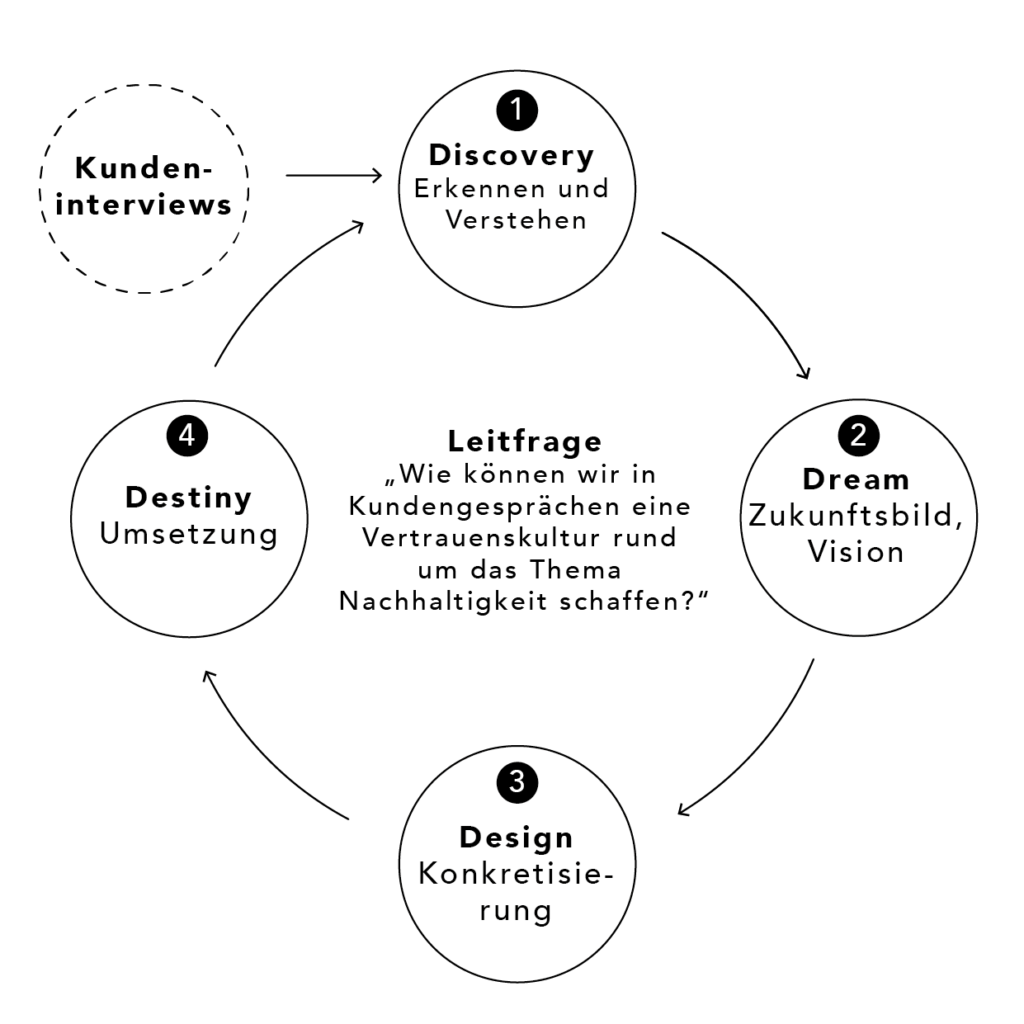For what?
Appreciative inquiry usually takes the form of
This method is used in large groups to promote a positive and optimistic attitude in individuals and teams. The focus is on appreciating the best in people (as colleagues, employees, negotiating partners, etc.) - both in relation to the past and the present and in identifying potential that provides inspiration for the future. Exploration is about asking questions that allow us to identify what is already working well and in which areas the conversation situation can be opened up for something new or how the new could manifest itself.
Example
As part of a reorganization, an IT development team is being expanded over several
locations. Employees with diverse backgrounds come together and are given the task of reorganizing collaboration as part of a cultural project. The challenge is that the locations and teams have already had different experiences with transformations of a similar nature: Some team members simply feel overwhelmed by the next strategy program - others feel unsure about what form of collaboration management ultimately wants. An appreciative exploration allows participants to focus on positive aspects of collaboration and adopt an optimistic attitude towards the upcoming project.
The method is suitable for situations in which people come together for the first time for a collaboration from which something new is to emerge - in virtual teams as well as at the negotiating table.
What matters
- Appreciative inquiry focuses exclusively on the positive: strengths that distinguish employees and the organization, and top performances that teams have already achieved.
- Critical aspects are not highlighted, which distinguishes appreciative inquiry from other large group methods such as open space.
- Especially in tense teams, appreciative exploration offers the opportunity to create an encouraging atmosphere: The aim is to focus the attention of all members of the organization on the positive.
- In times of VUCA and the pandemic, communication about negative aspects prevails in many organizations - with drastic consequences: Because what we focus our attention on is increasing. As a result, the stories we tell ourselves are beginning to come true.
- Conversely, numerous studies have shown that cultures always flourish when they have a positive image of themselves and their future. Appreciative inquiry is about creating a positive attitude and basic conviction when dealing with people, groups and social systems.
Step by step
Step 1
Discovery (recognizing and understanding): The first and often decisive step is to explore the history and present of the organization in an appreciative way. The focus is on emotions that lead to a sense of connection and belonging - linked to a powerful yet challenging core theme, such as "culture of collaboration for a stronger customer focus".
Step 2
Dream (create a picture of the future): In this step, dreaming is allowed: the best examples, the jewels of the organization's past and present, so to speak, are put together to form a picture of the future.
Step 3
Design (concretizing the image of the future): This step marks the beginning of the actual work on the future. In the design phase, the examples from the dream phase are further developed into concrete images of the future - often in the form of drawings, photos, models or formulated statements about the future.
Step 4
Destiny (implementation): Step 4 focuses on the question of what concrete work needs to be done to make the vision of the future a reality.
The appreciative exploration leads to project work - geared towards a common goal with a positive claim to solidarity.
Sample questions for the discovery phase
- How did you get involved with this organization - and what drew you to it in particular?
- What were your first impressions? What impressed you right from the start?
- With all the ups and downs you have already experienced: What is your most outstanding positive experience?
- Please tell a story that includes the following:
- What exactly happened? Which people are important in this context and why?
- How does this example show the best of what the organization can currently do?
- What factors are important to make this example special?
Framework
Duration: approx. 1 day (or 4 x 2 hours)
Format: virtual (e.g. video conference accompanied by virtual whiteboard) or in person
Participants: Large group or individual teams
You can find more information on this and other tools for overcoming business challenges with communicative means in the book




